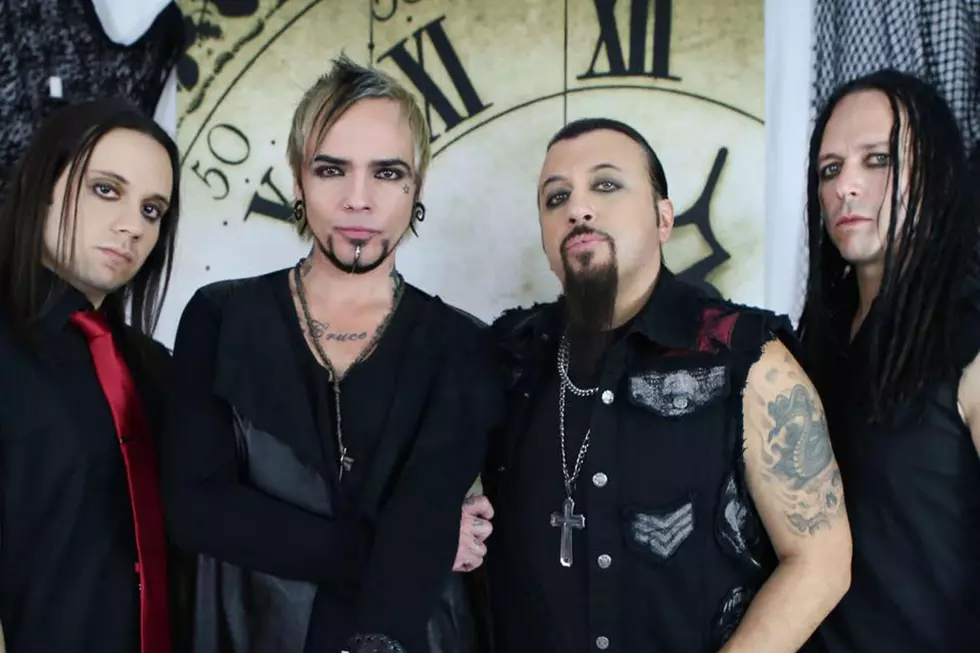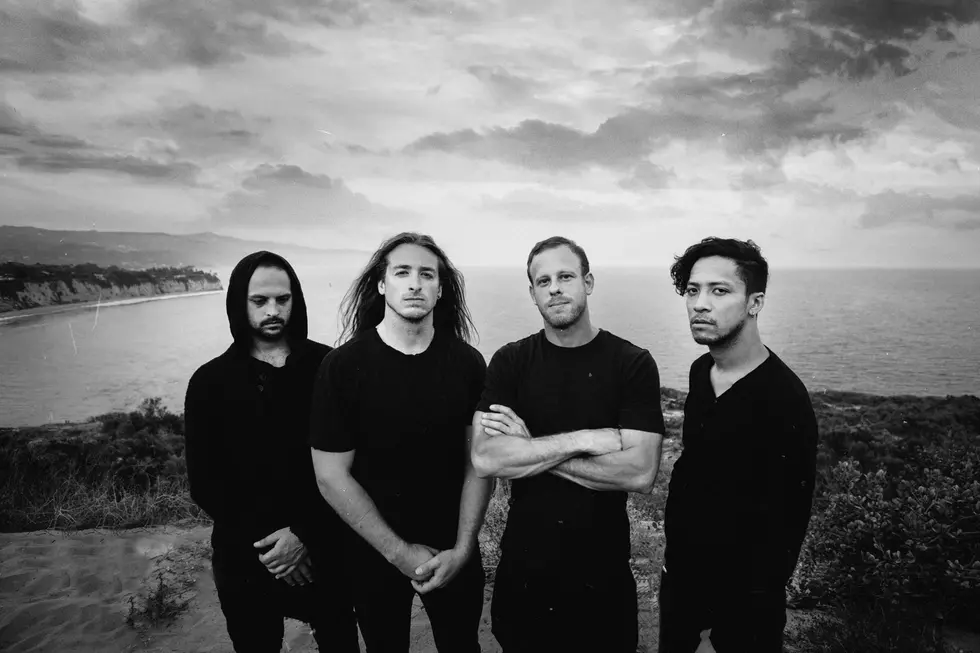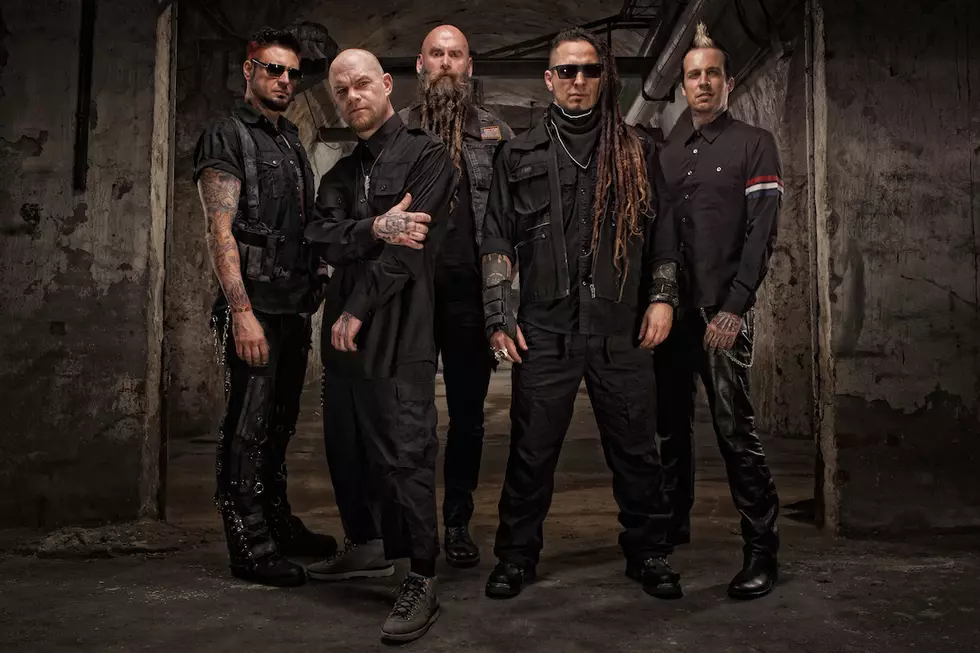My Ticket Home, ‘Hyperreal’ – Exclusive Video Premiere + Interview
Watch My Ticket Home's new video for 'Hyperreal' above. Pre-order their upcoming album unReal, due Oct. 6, from Spinefarm, and read our profile interview below.
A few select bands become touchstones for listeners, staying in their periphery no matter how far someone strays from the original point. This start could be anything, from the metallic posturing of nu-metal to the dreaded “emo phase" that would come to encompass any swooshy hair band in the mid 2000s. These genres are often relegated to being brief, embarrassing moments in someone’s journey through music taste. Years after first listening to these bands and making that journey into one’s own identity, few take the time to critically examine what made that music so pertinent. Even less pull it from the amber of nostalgia, and work on ways to progress far past its original point.
My Ticket Home have been trying to figure out exactly who they are since their beginning, and have settled into their identity with their upcoming album, unReal. Building on top of their success with prior album Strangers Only, the band manages to come into their own with beautiful and exciting riffs, everything done on their own terms. Having formed the band nearly ten years ago, singer Nick Giumenti has gone from a kid who just wanted to be in a band, to a leader with vision and making My Ticket Home the best band it could possibly be.
Nick and much of the group grew up in Columbus, Ohio. Many would probably assume Columbus to be a flyover city, but in reality it was a hotbed for some of the biggest metalcore bands of the time, including Beartooth, Attack Attack! and Like Moths to Flames. Ohio as a greater state gave birth to other scene heavyweights, The Devil Wears Prada, Miss May I and more, making Ohio a kind of Seattle for breakdowns. “As far as a music scene goes it’s better than most, just because there were a lot of bands,” Giumenti says. “Especially back in the days of emo music and post-hardcore music, things like that. There were a lot of bands out there doing it. Just to have an active scene and feel like there was a place for you, competition between a lot of bands.”
After Nick and his brother Marshall caught a show featuring Killswitch Engage, Every Time I Die, Dillinger Escape Plan and Parkway Drive, a switch flipped in their heads, solidifying their desire to play music. The brothers and original My Ticket Home member Sean Mackowski were all taking music lessons at the same guitar shop. One of the shop guys suggested they all play together, leading to them learning to play a song with each other, and then a writing session. Eventually they wrote an EP and began to play out.
Their original signing to Rise Records came after meeting with execs after opening for Attack Attack!’s record release show, with members of both bands sharing classes in high school. “[Attack Attack!] got signed and got pretty successful, at that time we were just doing our thing playing shows and recording music, had an EP,” says Giumenti. “I remember they asked us if we wanted to play their CD release show, at the Newport Music Hall, which is a legendary club in Columbus. The label came out to see them play for it, and I just remember saying, ‘Okay, the label is going to be there, we have to play really great and impress them.’ I remember it was the same day as my high school graduation, and somehow by a miracle I was able to convince my mom to let me skip graduation and play a show. So we all skipped graduation except Marshall who was a freshman at the time, and we all skipped graduation and played the show. Got to meet the guys from the label after the show, shake hands like ‘Hey man how you doing… sign my f-ing band!’ [Laughs] I guess we got lucky."
They signed to Rise, and dropped their EP The Opportunity To Be. The group would quickly become one of metalcore’s most promising acts, eventually resulting in their debut studio album To Create A Cure. The album isn't the most interesting listen in the world, falling in line with many other metalcore albums in the scene at the time. Regardless, it caught on with fans, their single “A New Breed” eventually netting them a million views on YouTube. The group would go on and tour off of it, playing across the country and accruing more fans. The realities of a band in that scene began to wear thin: travelling for hours only to play a six band bill with five bands that sound interchangeably from you. The group began to get tired of it.
“That’s kind of why [Strangers Only] happened,” Giumenti said. “I don’t mean to talk s-t on any band or anybody, people do what they want to do and that’s fine. For us, it was like after you’ve seen so many bands do the same thing over and over and over again, it just gets old. For me, it lost a lot of its appeal after touring with so many of these same bands, and seeing all these bands play and sound the same and say the same things on stage. It just seemed so pointless I guess. I don’t want to be a drag or anything, but I just feel like metalcore is for younger people. It requires more suspended disbelief than I have. Which is me being cynical, but it just wasn’t as fun. There were just so many things that came along with it I didn’t find appealing. Backtracks and samples, people just playing the same riffs. It really lost the appeal for us.”
The band experimented with a multitude of different styles and sounds, before going onto write what would ultimately become Strangers Only. The album is a lean, fireball of a listen with unapologetic influence taken from the bands the members looked up to to as kids. Album kickoff “Spit Not Chewed” is a blood-pressure raising jam, only slowing down riff-crunch for guitar flourishes ala Tom Morello before things crash to a finish. Ten plus years after nu-metal stopped iterating on itself, the group manages to dig the genre up and progress it. Metallic textures of yesteryear are shifted into an overdrive pace close to hardcore, culminating in a different enough sound the members would go on to coin “Puke Rock.”
In essence, the group puked out all remainders of their past lives as metalcore musicians in order to continue moving forward. With the intense sound change came a drop off in fans, as well as support from the label. But the group took it in stride, lining up house show dates to bring the music directly to fans in the chaos of backyard and garage gigs, something fans in the scene were probably unfamiliar with. It would help them work their way onto tours with the likes of scene veterans like Nonpoint and Killswitch Engage.
After Strangers Only was released, the group eventually left Rise Records, and found themselves with enough time on their hands to write their next LP. “There was a time period there where we had a different album,” says Giumenti. “Like written that we didn’t use anything of hardly. That was the bridge between Strangers Only and this one, Unreal, so I feel like if people had heard that and we’d been on a label at that time a few years ago, it was in the middle between this stuff. But in our opinion it just wasn’t that good and it wasn’t as good as it could’ve been and we didn’t end up using it. So I guess that’s kind of how we got to this album.”
What resulted from these writing sessions was unReal, the next step in the band’s songwriting and power as a band. The sonic flourish of the record springs out of its single “Hyperreal,” capturing a push pull dynamic of fatalistic melody, and total attitude from the band. Each track on the record sets out to explore something different, but keeps a cohesive style. It surpasses what they came up with as kids, becoming a confident and cool ripper of an album.
unReal’s greatest strength as an album is harnessing the sounds and feelings that made heavy alt-rock a force to be reckoned with in the '90s and '00s, and taking an unnostalgic approach to songwriting. It might be easy to point and mark songs’ similarities to the likes of Deftones or Quicksand, but there’s never a one to one correlation between bands. Instead, My Ticket Home take far more from the mentality of the time, of trusting one’s own taste and ability and letting songs arrive where they need to. The album is packed with easily some of their heaviest material, “Flypaper” delivering an instantly classic sounding riff for a chorus, “ Gasoline Kiss” making every song that’s ever appeared in a street racing movie look foolish. The flip side is the group’s lushest work to date, the shoegazey waves of “Joi” creating an ocean of sound to sink in. It’s an album born of intense love for their forefathers of the genre, resulting in an album the band wants to hear more than anyone else.
Vocally, Nick has stepped up his role tremendously in the band, exceeding past the barrier of “screamer” and fully embracing his voice. His singing reaches a state of being almost beautiful, but packing enough grit before it ever gets too delicate. Lyrically, the break has helped push his lyrics forward, giving his words a surreal bend. You can grab bands by the truckload that are so eager to tell you how to feel, content becomes a demand that you don’t feel alone. But maybe, the lyrics of “Melancholia” suggest, feeling disconnected is okay. “I’d so much rather ask a listener a question, and let them answer it for themselves,” Giumenti says. “The last thing people need in today’s f-king society is another person trying to tell them how things are. For god’s sake, just give people some piece of art that’s free of that.”
unReal is an exciting album that gives hope to rock music being as innovative and exciting as it can be at its peak. My Ticket Home have embraced all of the textures of their work, following through with an album worthy to continue the work set by bands like Deftones and Glassjaw, posing themselves to be rock’s next breakout act. One of the producers we did some sessions with was Johnny K. He said, “[Rock] just needs a kick in the balls, it needs someone to come along with an attitude.” That really excited me, like how cool would it be if we were that band? Just to have our own space and to be a band that could live on the radio but who didn’t suck, have the attitude still be there.”
More From Loudwire
![Ida Mae Tap Greta Van Fleet’s Jake Kiszka for ‘Long Gone and Heartworn,’ an Adrenaline Rush of a Song [Exclusive Premiere]](http://townsquare.media/site/366/files/2021/07/attachment-ida_mae_jake_kiszka_greta_van_fleet.jpg?w=980&q=75)








